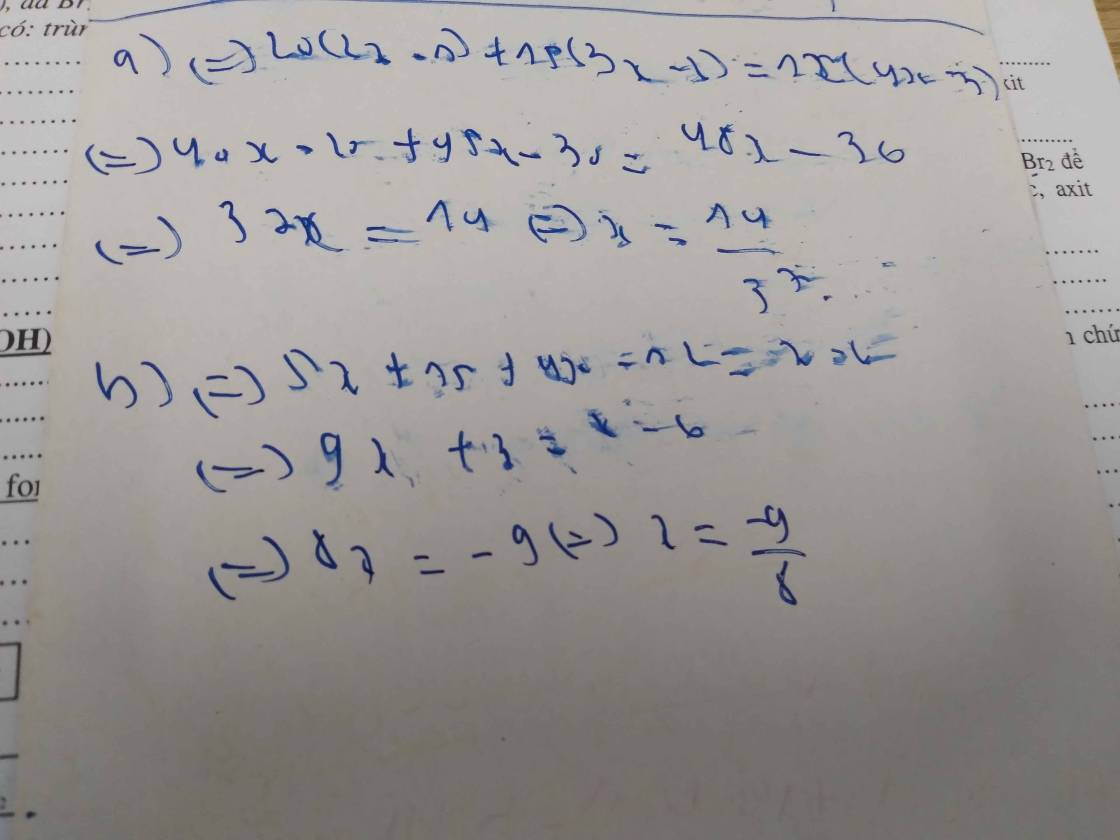Hãy nhập câu hỏi của bạn vào đây, nếu là tài khoản VIP, bạn sẽ được ưu tiên trả lời.

\(Đk:\) \(x\ne1,x\ne2,x\ne3\)
\(\Rightarrow\dfrac{x+4}{\left(x-2\right)\left(x-1\right)}+\dfrac{x+1}{\left(x-3\right)\left(x-1\right)}=\dfrac{2x+5}{\left(x-3\right)\left(x-1\right)}\)
\(\Rightarrow\dfrac{\left(x+4\right)\cdot\left(x-3\right)+\left(x+1\right)\left(x-2\right)}{\left(x-2\right)\left(x-1\right)\left(x-3\right)}=\dfrac{\left(2x+5\right)\left(x-2\right)}{\left(x-3\right)\left(x-1\right)\left(x-2\right)}\)
\(\Rightarrow x^2-3x+4x-12+x^2-2x+x-2=2x^2-4x+5x-10\)
\(\Rightarrow0x-14=x-10\)
\(\Rightarrow x=-4\left(tmđk\right)\)

\(\dfrac{x+1}{39}+\dfrac{x+2}{38}+\dfrac{x+3}{37}=0\)
\(\Leftrightarrow\dfrac{x+1}{39}+1+\dfrac{x+2}{38}+1+\dfrac{x+3}{37}+1-3=0\)
\(\Leftrightarrow\dfrac{x+40}{39}+\dfrac{x+40}{38}+\dfrac{x+40}{37}=3\)
\(\Leftrightarrow\left(x+40\right)\left(\dfrac{1}{39}+\dfrac{1}{38}+\dfrac{1}{37}\right)=3\)
\(\Leftrightarrow\left(x+40\right).\dfrac{4331}{54834}=3\)
\(\Leftrightarrow x+40=\dfrac{164502}{4331}\)
\(\Leftrightarrow x=\dfrac{-8738}{4331}\)
-Vậy \(S=\left\{\dfrac{-8738}{4331}\right\}\)

a: =>3,6-1,7x=2,3-1,4-4=0,9-4=-3,1
=>1,7x=6,7
hay x=67/17
b: \(\Leftrightarrow30\left(5x+4\right)-15\left(3x+5\right)=24\left(4x+9\right)-40\left(x-9\right)\)
=>150x+120-45x-75=96x+216-40x+360
=>105x+45=56x+576
=>49x=531
hay x=531/49

a) \(\dfrac{x+1}{4}-\dfrac{5+2x}{8}=\dfrac{3-4x}{2}\)
⇔\(\dfrac{2\left(x+1\right)}{8}-\dfrac{5+2x}{8}=\dfrac{4\left(3-4x\right)}{8}\)
⇔ 2x + 2 - 5 - 2x = 12 -16x
⇔ 16x = 15
⇔ x = 15/16
b) \(\dfrac{4-3x}{5}-\dfrac{4-x}{10}=\dfrac{x+2}{2}\)
⇔\(\dfrac{2\left(4-3x\right)}{10}-\dfrac{4-x}{10}=\dfrac{5\left(x+2\right)}{10}\)
⇔ 8 - 6x - 4 + x = 5x + 10
⇔ 10x = -6
⇔ x = -6/10
Câu 1:
x + 1/4 - 5 + 2x/8 = 3 - 4x/2
<=> 2x + 2/8 - 5 + 2x/8 = 12 - 16x/8
<=> 2x + 2 - 5 - 2x = 12 - 16x
<=> -3 = 12 - 16x <=> 15 = 16x <=> x = 15/16
Câu 2:
4 - 3x/5 - 4 - x/10 = x + 2/2
<=> 8 - 6x/10 - 4 - x/10 = 5x + 10/10
<=> 8 - 6x - 4 + x = 5x + 10
<=> 4 - 5x = 5x + 10
<=> 4 = 10x + 10 <=> 10x = -6 <=> x = -3/5

\(1,\dfrac{4x-4}{3}=\dfrac{7-x}{5}\\ \Leftrightarrow5\left(4x-4\right)=3\left(7-x\right)\\ \Leftrightarrow20x-20=21-3x\\ \Leftrightarrow17x=41\Leftrightarrow x=\dfrac{41}{17}\)
\(2,\dfrac{3x-9}{5}=\dfrac{3-x}{2}\\ \Leftrightarrow6x-18=15-5x\\ \Leftrightarrow11x=33\\ \Leftrightarrow x=3\)
\(3,\dfrac{2x-1}{5}-\dfrac{3-x}{3}=1\\ \Leftrightarrow\dfrac{6x-3-15+5x}{15}=1\\ \Leftrightarrow11x-18=1\\ \Leftrightarrow x=\dfrac{19}{11}\)
\(4,\dfrac{x-5}{3}+\dfrac{3x+4}{2}=\dfrac{5x+2}{6}\\ \Leftrightarrow2x-10+9x+12=5x+2\\ \Leftrightarrow6x=0\Leftrightarrow x=0\)
\(5,\dfrac{x-3}{2}+\dfrac{2x+3}{5}=\dfrac{2x+5}{10}\\ \Leftrightarrow5x-15+4x+6=2x+5\\ \Leftrightarrow7x=14\\ \Leftrightarrow x=2\)
Tick nha
2: Ta có: \(\dfrac{3x-9}{5}=\dfrac{3-x}{2}\)
\(\Leftrightarrow6x-18=15-5x\)
\(\Leftrightarrow11x=33\)
hay x=3

a: \(\Leftrightarrow7\left(7-3x\right)+12\left(5x+2\right)=84\left(x+13\right)\)
\(\Leftrightarrow49-21x+60x+24=84x+1092\)
\(\Leftrightarrow39x-84x=1092-73\)
=>-45x=1019
hay x=-1019/45
b: \(\Leftrightarrow21\left(x+3\right)-14=4\left(5x+9\right)-7\left(7x-9\right)\)
=>21x+63-14=20x+36-49x+63
=>21x+49=-29x+99
=>50x=50
hay x=1
c: \(\Leftrightarrow7\left(2x+1\right)-3\left(5x+2\right)=21x+63\)
=>14x+7-15x-6-21x-63=0
=>-22x-64=0
hay x=-32/11
d: \(\Leftrightarrow35\left(2x-3\right)-15\left(2x+3\right)=21\left(4x+3\right)-17\cdot105\)
=>70x-105-30x-45=84x+63-1785
=>40x-150-84x+1722=0
=>-44x+1572=0
hay x=393/11

1: Ta có: \(\dfrac{3}{x+2}-\dfrac{x-1}{x^2-4}=\dfrac{2}{x-2}\)
Suy ra: \(3x-6-x+1=2x+4\)
\(\Leftrightarrow2x-5=2x+4\left(vôlý\right)\)
2: Ta có: \(\dfrac{x-5}{2x-3}-\dfrac{x}{2x+3}=\dfrac{1-6x}{4x^2-9}\)
Suy ra: \(\left(x-5\right)\left(2x+3\right)-x\left(2x-3\right)=1-6x\)
\(\Leftrightarrow2x^2-7x-15-2x^2+6x+6x-1=0\)
\(\Leftrightarrow5x=16\)
hay \(x=\dfrac{16}{5}\)

g.\(\dfrac{1-3x}{6}+x-1=\dfrac{x+2}{2}\)
\(\Leftrightarrow\dfrac{\left(1-3x\right)+6\left(x-1\right)}{6}=\dfrac{3\left(x+2\right)}{6}\)
\(\Leftrightarrow\left(1-3x\right)+6\left(x-1\right)=3\left(x+2\right)\)
\(\Leftrightarrow1-3x+6x-6=3x+6\)
\(\Leftrightarrow-5=6\left(vô.lí\right)\)
Vậy pt vô nghiệm
h.\(\dfrac{3\left(2x+1\right)}{4}-5-\dfrac{3x+2}{10}=\dfrac{2\left(3x-1\right)}{5}\)
\(\Leftrightarrow\dfrac{15\left(2x+1\right)-100-2\left(3x+2\right)}{20}=\dfrac{8\left(3x-1\right)}{20}\)
\(\Leftrightarrow15\left(2x+1\right)-100-2\left(3x+2\right)=8\left(3x-1\right)\)
\(\Leftrightarrow30x+15-100-6x-4=24x-8\)
\(\Leftrightarrow-89=-8\left(vô.lí\right)\)
Vậy pt vô nghiệm

\(\dfrac{2x-1}{3}+\dfrac{3x-2}{4}=\dfrac{4x-3}{5}\)
\(\Leftrightarrow\dfrac{20\left(2x-1\right)}{60}+\dfrac{15\left(3x-2\right)}{60}=\dfrac{12\left(4x-3\right)}{60}\)
`<=> 20(2x-1) +15(3x-2) =12(4x-3)`
`<=> 40x - 20 + 45x - 30 = 48x - 36`
`<=> 85x -50 = 48x - 36`
`<=> 85x-48x = -36+50`
`<=> 37x =14`
`<=> x= 14/37`
Vậy phương trình có nghiệm `x=14/37`
__
\(\dfrac{5}{x-3}+\dfrac{4}{x+3}=\dfrac{x-6}{x^2-9}\)
\(\Leftrightarrow\dfrac{5}{x-3}+\dfrac{4}{x+3}=\dfrac{x-6}{\left(x-3\right)\left(x+3\right)}\)
ĐKXĐ : \(\left\{{}\begin{matrix}x-3\ne0\\x+3\ne0\end{matrix}\right.\Leftrightarrow\left\{{}\begin{matrix}x\ne3\\x\ne-3\end{matrix}\right.\)
Ta có : \(\dfrac{5}{x-3}+\dfrac{4}{x+3}=\dfrac{x-6}{\left(x-3\right)\left(x+3\right)}\)
\(\Leftrightarrow\dfrac{5\left(x+3\right)}{\left(x-3\right)\left(x+3\right)}+\dfrac{4\left(x-3\right)}{\left(x+3\right)\left(x-3\right)}=\dfrac{x-6}{\left(x-3\right)\left(x+3\right)}\)
`=> 5x + 15 + 4x -12=x-6`
`<=> 9x + 3=x-6`
`<=> 9x-x=-6-3`
`<=> 8x = -9`
`<=>x=-9/8(tm)`
Vậy phương trình có nghiệm `x=-9/8`
` @ yngoc`

\(\Leftrightarrow\dfrac{5}{x^2+1}+\dfrac{7}{x^2+3}+\dfrac{9}{x^2+5}-\dfrac{4x^2+26}{x^2+10}=0\)
\(\Leftrightarrow\dfrac{5}{x^2+1}-1+\dfrac{7}{x^2+3}-1+\dfrac{9}{x^2+5}-1-\dfrac{4x^2+26}{x^2+10}+3=0\)
\(\Leftrightarrow\dfrac{4-x^2}{x^2+1}+\dfrac{4-x^2}{x^2+3}+\dfrac{4-x^2}{x^2+5}-\dfrac{x^2-4}{x^2+10}=0\)
\(\Leftrightarrow\left(4-x^2\right)\left(\dfrac{1}{x^2+1}+\dfrac{1}{x^2+3}+\dfrac{1}{x^2+5}+\dfrac{1}{x^2+10}\right)=0\)
\(\Leftrightarrow4-x^2=0\)(vì \(\dfrac{1}{x^2+1}+\dfrac{1}{x^2+3}+\dfrac{1}{x^2+5}+\dfrac{1}{x^2+10}>0\))
\(\Leftrightarrow x=\pm2\)